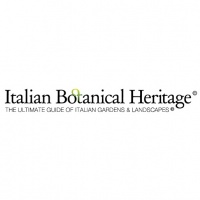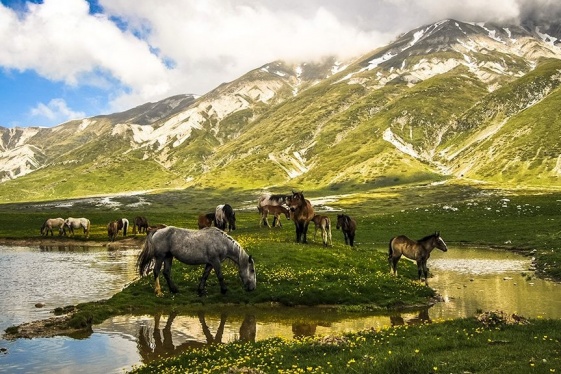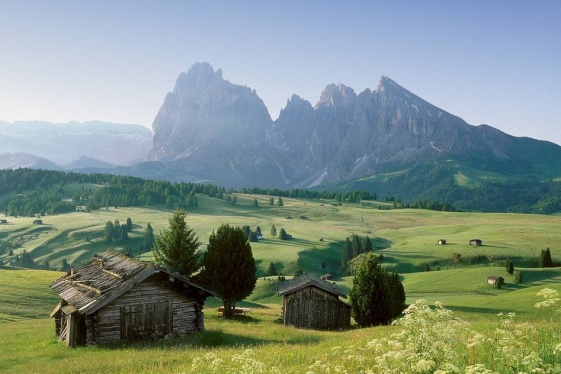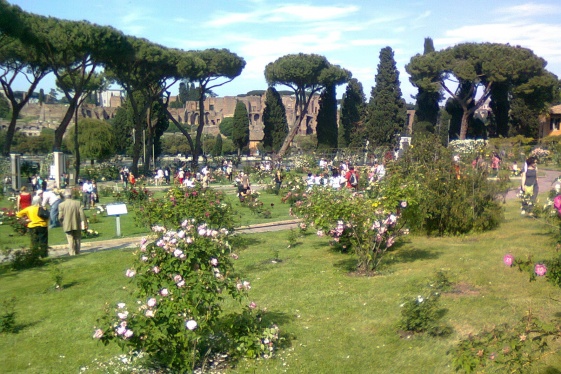
Italian Botanical Heritage
Italian Botanical Heritage is a project aimed at fostering the knowledge of the Italian botanical, artistic and cultural Italian heritage and the development of green tourism in Italy, and to become a virtual meeting platform between enthusiasts of this field.
Italian gardens: Campo Imperatore Plateau
In Abruzzo, in the heart of the Gran Sasso massif, surrounded by some of the highest and most suggestive peaks of the Apennines, lies the Campo Imperatore plateau, nicknamed the Tibet of Abruzzo. The origin of this wide flat valley is to be found in the long work of floods and glaciers, which have gently shaped the morphology of the slope, giving s...
Italian gardens: Alpe di Siusi and Sciliar Nature Park
The Alpe di Siusi is one of the largest plateaus in Europe, which extends for 184,000 square feet. With the lowest point at an altitude of 6,069 ft and the highest at 7,709 ft above sea level, it is the largest of the Italian pastures. Reachable by cable car and through a single road, is devoid of villages but there are tourist facilities and shelt...
Italian gardens: Aventino's Municipal Rose Garden
The Rose Garden of Rome is located on the slopes of the Aventine Hill, and from there you can enjoy a raised view of the Circus Maximus and the Palatine Hill.
Italian gardens: Minerva's Garden in Salerno
Minerva’s Garden is a botanical garden located in the ancient center of Salerno, close to the western walls of the medieval city along the course of the river Fusandola. During the Middle Ages it was used as a simple garden for educational purposes for students of the Medical School of Salerno, and for this reason it is considered a precursor of th...
Italian gardens: Villa Melzi d'Eril, Como Lake
Villa Melzi, located on the eastern shore of Lake Como, was built between 1808 and 1810, in a sober and elegant neoclassical style, designed by the architect Giocondo Albertolli at the request of the Duke of Lodi Francesco Melzi d'Eril, then vice-president of the First Italian Republic and later Grand Chancellor of the Kingdom of Italy, as well as...
Italian gardens: Gran Paradiso National Park
Established in 1922, the Gran Paradiso National Park is the oldest Italian National Park together with the Abruzzo National Park, created a few months later. It is located between the regions of Valle d'Aosta and Piedmont. It covers an area of 71,043.79 hectares, on a predominantly mountainous terrain, in an agricultural landscape that joins the ar...
Italian gardens: The Leonini Horti in Florence
The Leonini Horti dates back to the period of reconstruction immediately after the long war that culminated with the fall of the Republic of Siena in 1558, commissioned and built by Diomede Leoni in conjunction with the restoration of the ancient walls. Monsignor Lattanzi, on November 8, 1581, wrote that "within the said Land of San Quirico, alread...
Italian gardens: Pantano di Policoro Wood, Matera
The Pantano di Policoro Wood is a protected natural area in the province of Matera, established in 1999, designated Site of Community Importance (SCI) and Special Protection Area (SPA). It occupies an area of 500 hectares, 21 of which are WWF Italy Oases, gathered under the denomination of "WWF Oasis Policoro Herakleia".
Italian gardens: Villa Taranto Botanical Gardens
The Gardens of Villa Taranto are located on the promontory of Castagnola, along the road that connects Pallanza to Intra, on the western shore of Lake Maggiore. They were created by Neil Mc Eacharn (1184-1964), a captain of Scottish origin, a great lover of botany and Italy, which he had visited in his youth. In 1928 McEacharn returned to Italy wit...
Italian gardens: Monte Subasio Park
Along the ridge of the Monte Subasio massif, there are some isolated peaks, the most important of which are, from north to south, Monte Subasio (1290 m), Monte Civitelle (1280 m) and La Sermolla (1191 m). In addition, the north-western end of the hill is San Rufino (1110 m) and the south-eastern end of the hill is Madonna della Spella (978 m); furt...
Italian gardens: The Biviere garden in Lentini, Siracusa
Born from the love and botanical passion of the last owners, the princes Scipione and Maria Carla Borghese, the Biviere Garden occupies a vast area between the plain of Catania and the northern slopes of the Iblei Mountains, west of the Ionian Sea. A wonderful example of a Mediterranean-Esotic garden, it extends for about 3 hectares, on three diff...
Italian gardens: Villa del Principe, Genoa
The Prince's Villa was the residence of the only Prince Genoa has ever had. It was in 1529 when Andrea Doria, a talented admiral and legendary gunman, started the work that would lead to the construction of this marvellous palace overlooking the Gulf of Genoa, in Lguria. The place would become the prince's retreat of peace on his return from countl...














